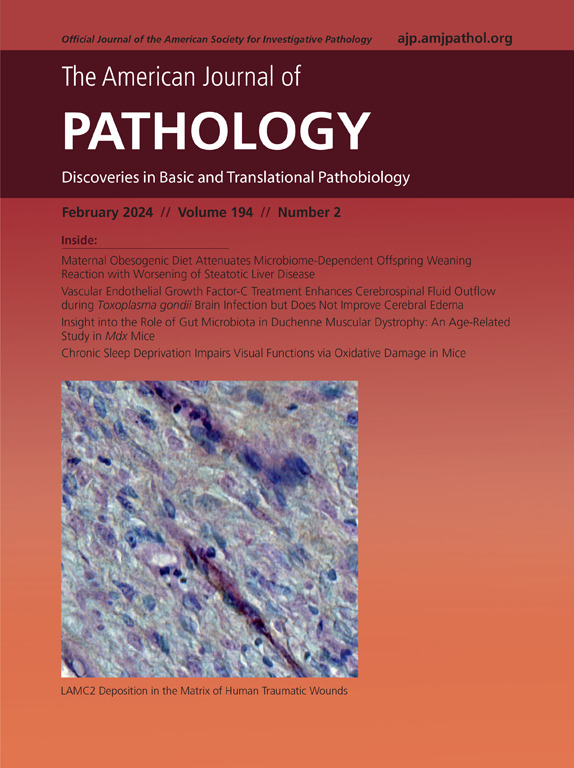miRNA and mRNA Signatures in Human Acute Kidney Injury Tissue
IF 4.7
2区 医学
Q1 PATHOLOGY
引用次数: 0
Abstract
Acute kidney injury (AKI) is an important contributor to the development of chronic kidney disease (CKD). There is a need to understand molecular mediators that drive recovery and progression to CKD. In particular, the regulatory role of miRNAs in AKI is poorly understood. Herein, miRNA and mRNA sequencing were performed on biobanked human kidney tissues obtained during the routine care of subjects with a diagnosis of AKI, minimal change disease, or on nephrectomy tissue with no known kidney disease. mRNA analysis revealed that nephrectomy tissues exhibited an injury signature similar to that of AKI which was not identified in minimal change disease samples. The transcriptomic signature of human AKI was enriched in pathways involved in cell adhesion, epithelial-to-mesenchymal transition, and cell cycle arrest (eg, CDH6, ITGB6, CDKN1A). In AKI, up-regulation of miR-146a, miR-155, miR-142, and miR-122 was associated with pathways involved in immune cell recruitment, inflammation, and epithelial-to-mesenchymal transition. miR-122 and miR-146 were associated with down-regulation of DDR2 and IGFBP6, which are genes involved in the recovery and progression of kidney disease. These data provide integrated miRNA signatures that complement mRNA and other epigenetic data available in kidney atlases.

人类急性肾损伤组织中的 miRNA 和 mRNA 信号。
急性肾损伤(AKI)是导致慢性肾脏病(CKD)发展的重要因素。我们需要了解推动恢复和发展为慢性肾脏病的分子介质。mRNA分析表明,Ref组织表现出与AKI相似的损伤特征,但在MCD样本中没有发现。人类 AKI 的转录组特征富含参与细胞粘附、上皮细胞向间质转化和细胞周期停滞的通路(如 CDH6、ITGB6、CDKN1A)。在 AKI 中,miR-146a、miR-155、miR-142、miR-122 的上调与免疫细胞招募、炎症和上皮细胞向间质转化的通路相关。这些数据提供了综合的 miRNA 特征,补充了肾脏图谱中的 mRNA 和其他表观遗传学数据。
本文章由计算机程序翻译,如有差异,请以英文原文为准。
求助全文
约1分钟内获得全文
求助全文
来源期刊
CiteScore
11.40
自引率
0.00%
发文量
178
审稿时长
30 days
期刊介绍:
The American Journal of Pathology, official journal of the American Society for Investigative Pathology, published by Elsevier, Inc., seeks high-quality original research reports, reviews, and commentaries related to the molecular and cellular basis of disease. The editors will consider basic, translational, and clinical investigations that directly address mechanisms of pathogenesis or provide a foundation for future mechanistic inquiries. Examples of such foundational investigations include data mining, identification of biomarkers, molecular pathology, and discovery research. Foundational studies that incorporate deep learning and artificial intelligence are also welcome. High priority is given to studies of human disease and relevant experimental models using molecular, cellular, and organismal approaches.

 求助内容:
求助内容: 应助结果提醒方式:
应助结果提醒方式:


